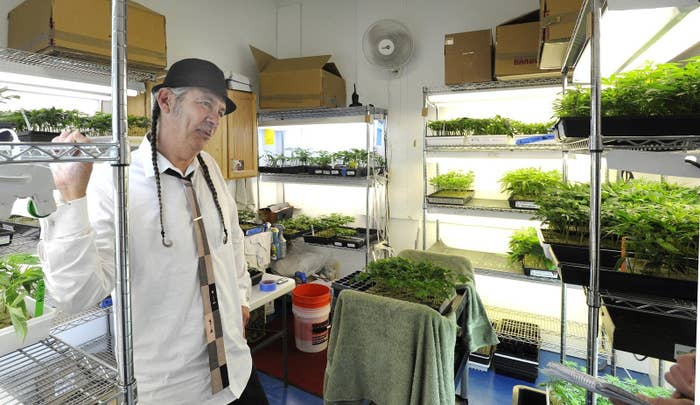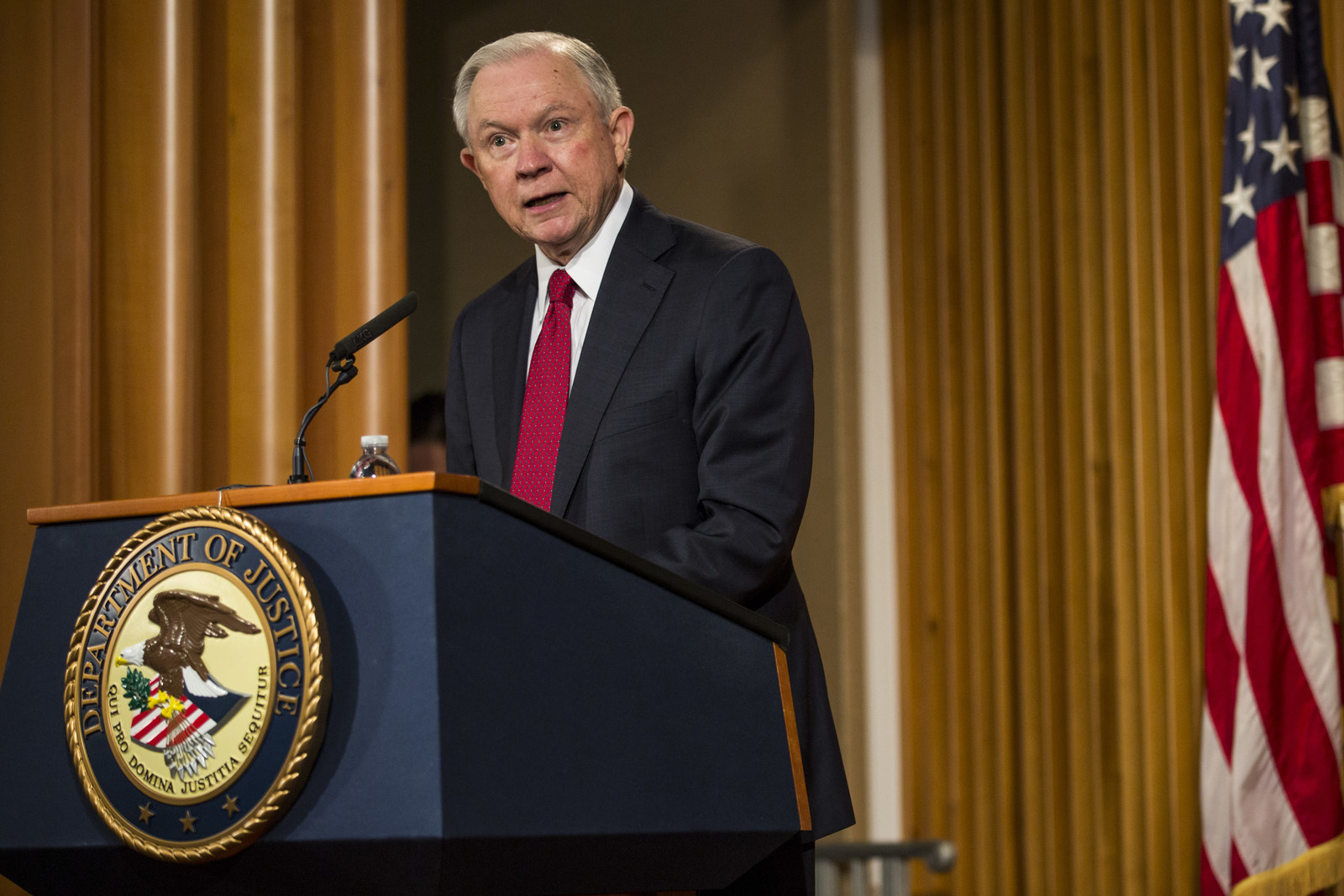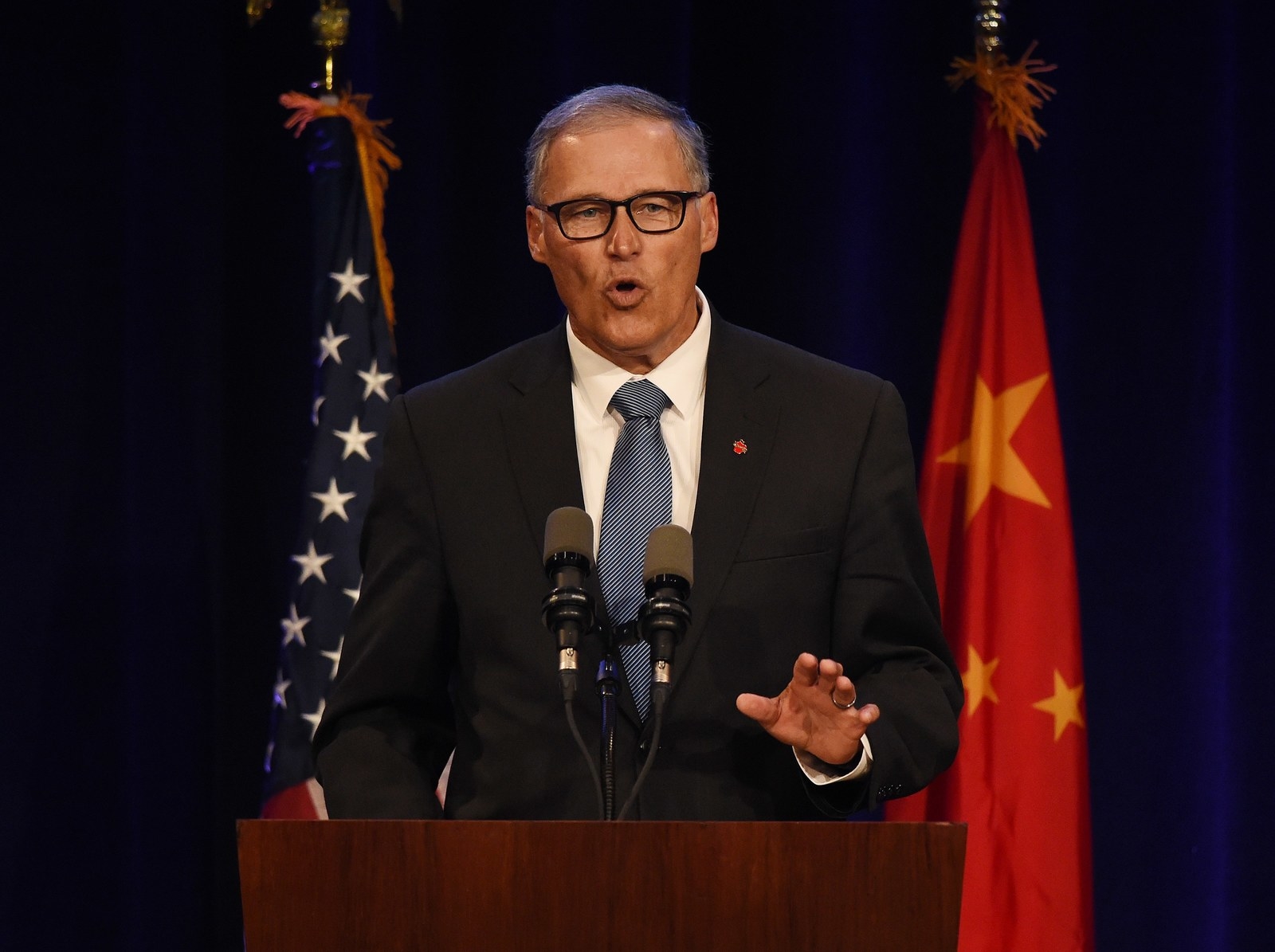
Steve DeAngelo’s phone rang about five minutes before he opened his Oakland medical cannabis dispensary, Harborside Health Center, for the very first time back in 2006. He learned that the feds were raiding in San Francisco, and they were heading to Oakland next.
DeAngelo thought about it, and opened anyway. He wasn’t raided that day, but the fear of federal intervention stuck with him and his staff. Now, to this day, DeAngelo hosts an annual mock raid, complete with role play and people dressed in police costumes, to teach staff and patients how to behave if law enforcement shows up. In years past, the federal crackdowns could get violent, DeAngelo said, and he worried how his employees would react.
“We didn’t want to get shot, we didn’t want someone to get hurt, and these raids, they’re like military, SWAT-style raids. So we felt that we had to have that kind of retraining to keep everybody safe and make sure that nobody got hurt,” DeAngelo said.
Under President Barack Obama, those raids came in a trickle, and a hands-off approach came to define how the Department of Justice treated a budding cannabis industry. But there are increasing signals that, under President Donald J. Trump and Attorney General Jeff Sessions, mock raid training could become more relevant than ever in the swelling $7 billion cannabis industry. While cannabis is legal in over half the country, the federal stance is unambiguous: Cannabis remains illegal — and the new administration has recently said that it intends to enforce the law.
Since being confirmed, Sessions has slowly revealed what his plans for the cannabis industry could be, telling reporters this week that “experts are telling me there's more violence around marijuana than one would think.”
Trump had previously offered clues about his feelings on cannabis, and said on the campaign trail in 2015 that he thought Colorado’s experiences with cannabis should be studied, adding that legalization “should be a state issue.”
Much of the current conversation about the cannabis industry under Trump centers around the importance of the Cole Memorandum, a 2013 DOJ memo that essentially set conditions for states to meet to avoid being targeted by the feds. These conditions include keeping pot away from children and working to prevent cannabis from being transported across state lines.
Michael Correia, director of government relations for the National Cannabis Industry Association, assumed that if Hillary Clinton were elected, the Cole Memo would stay in place. Now, he’s not so sure.
“I think with the election of Trump, that there’s a little uncertainty. Will they keep the Cole Memo? Will they change the Cole Memo? What will happen?” Correia said.
With that uncertainty looming, members of the cannabis industry are clinging to Trump’s statements during the campaign about states’ rights; Trump calls himself a jobs president, after all. But last week, White House press secretary Sean Spicer seemed to upend some of that cautious optimism when he was asked by a reporter if the feds would enforce federal drug law. “I do believe you will see greater enforcement of it,” Spicer said. This hinted at a federal crackdown on cannabis businesses — but not necessarily all cannabis businesses.
“There's still a federal law that we need to abide by when it comes to recreational marijuana."
Spicer, who did not respond to interview requests, distinguished between medical and recreational cannabis, saying that Trump “understands the pain and suffering that many people go through who are facing especially terminal diseases and the comfort that some of these drugs including medical marijuana can bring to them.” But when it came to recreational cannabis, Spicer drew a comparison between recreational cannabis use and opiate abuse. “When you see something like the opioid addiction crisis blossoming in so many states around this country, the last thing we should be doing is encouraging people — there's still a federal law that we need to abide by when it comes to recreational marijuana,” Spicer said.
That link to the opioid crisis rubbed some cannabis industry members the wrong way, including DeAngelo. “What we’ve seen at Harborside is patients who come into Harborside on the opioids who gradually, over time, first reduce their opioid use, and then completely eliminate it, using cannabis,” DeAngelo said.
Spicer’s comments also stand in contrast with scientific evidence that cannabis could be useful in combating opioid abuse. In a 2014 article in the American Medical Association's journal of internal medicine, the results showed that states with laws that allow medical cannabis had about 25% fewer opioid-related overdose deaths, compared to states that do not permit medical cannabis.
Unlike Trump, Sessions has been explicit about his stance on the plant. At the Caucus on International Narcotics Control in April 2016, then-Senator Sessions said, “We need grown-ups in charge in Washington deciding marijuana is not the kind of thing that ought to be legalized.”

In a meeting with reporters this week, providing perhaps the clearest indications yet that a crackdown is not off the table, Sessions doubled down on previous anti-cannabis sentiments. "I am definitely not a fan of expanded use of marijuana," Sessions said to reporters. "But states, they can pass the laws they choose. I would just say, it does remain a violation of federal law to distribute marijuana throughout any place in the United States, whether a state legalizes it or not.”
So what could a cannabis crackdown look like? In the past, business owners have faced raids, like the ones that DeAngelo prepares his staff to face.
“It’s always a possibility,” DeAngelo said. “And the reality is that we just don’t know when we come to work in the morning, I don’t know whether I’m coming home at night or whether a federal agent is going to arrest me and take me to prison.”
But there are other ways the federal government has attempted to squash the industry. DeAngelo has battled with the feds over his taxes, too.
“They’ve essentially been trying to tax us out of existence ever since we opened,” DeAngelo said, referencing the 280E tax code, which prevents cannabis business owners from deducting many expenses from their income.
The cannabis industry has mobilized in the face of this potential existential threat, and business owners, lobbyists, and consultants are strategizing — a challenge without knowing exactly what the DOJ plans to do.
“Some people are extremely concerned and think that it’s naive to expect anything other than a potential crackdown. I would say the majority of people at this point, including NCIA as an organization, is operating under a certain amount of cautious optimism. We’re definitely not taking anything for granted — we’re definitely not laying back and assuming everything will be okay,” said Taylor West, deputy director of NCIA.
Kris Krane, president of 4Front Ventures, a cannabis consulting firm, said he anticipates the pockets of the industry that are likely to be most nervous are in states like Colorado, Oregon, and Washington, where the cannabis markets are mature, where thousands of jobs have been created, and where there’s the most at stake.
Federal intervention on cannabis businesses could be politically unpopular for Trump, a man who cares deeply about polls and ratings. Quinnipiac University released a poll last week that showed that 71% of Americans are opposed to the feds interfering with state-legal cannabis. In addition, 93% of those surveyed support medical cannabis if recommended by a doctor, and 59% support legalization for recreational use.
“I would argue that they would face substantial political blowback if they did try and go after businesses in the adult use states,” Krane said.
Washington State leaders are just about ready to fight if the Department of Justice, which declined to comment, decides to intervene. Attorney General Bob Ferguson and Gov. Jay Inslee wrote a formal letter to Sessions asking for a meeting and indicated that they intend to defend their state law, which voters approved in 2012, against federal intervention.

“The federal government could attempt to end the state-regulated marijuana industry through actual or threatened prosecutions. But to what end?” they wrote. Ferguson and Inslee said that the federal government lacked the resources to enforce a return to a “full” prohibition on pot, and risked increasing illegal activity if it tried. “It is far more likely that commerce in marijuana will simply move back underground, returning bumper profits to criminal groups while once again depleting government resources,” their letter read.
Brian Smith, the communications director for the Washington State Liquor and Cannabis Board, said that he “gave that message to our own employees that if a [cannabis business] licensee contacts you with concerns about what we’re doing, it’s business as usual.”
A crackdown could put many state regulators in a state of limbo, says Andrew Freedman, the former director of marijuana coordination for Colorado, who is now a consultant to governments that are implementing cannabis laws. When Colorado voters passed legalization in 2012, they also voted to amend the state constitution to add legalized cannabis. That means state regulators would be constitutionally obliged to follow Colorado law and continue to license cannabis businesses — even in the event of federal intervention.
“We would have no powers in the state to arrest people selling marijuana. Because it’s on the state side, it’s legal,” Freedman said. “So they’d have to send in the troops on the federal side in order to enforce the law, and that would be a pretty crazy situation.”
Of all regulators, this is perhaps the most challenging time for the woman who will be regulating the largest legal cannabis market in the world. Lori Ajax, California’s chief of the bureau of medical cannabis regulation — or “pot czar” — has been traveling the state for the last year to educate the many sprawling, semi-regulated medical cannabis industry members, and to solicit their input on forthcoming regulations.
“People are watching very closely what’s going on at the federal level,” Ajax said. “Now, we still have the federal guidelines under the Cole Memo that we’re operating under, so we’re going to continue to do that.”
"They could get rid of a regulated, taxed industry and replace it with an unregulated, untaxed industry."
California’s cannabis industry has the support of the state’s lieutenant governor, Gavin Newsom, a legalization supporter and a 2018 gubernatorial hopeful. In February, Newsom wrote a letter to Trump pleading with him to hold back on federal enforcement.
"I urge you and your administration to work in partnership with California and the other eight states that have legalized recreational marijuana for adult use in a way that will let us enforce our state laws that protects the public and our children, while targeting the bad actors,” Newsom wrote.
While the coming months could mean status quo or chaos for the cannabis industry, the broad approach seems to be: Until something changes, it’s business as usual. Mark Kleiman, a professor of public policy at New York University and drug policy expert focusing on cannabis for nearly four decades, doesn’t think cannabis is a top priority for the Drug Enforcement Administration. A spokesperson for the DEA declined to comment for this story.
“They could stop it if they wanted to. But they couldn’t replace it with anything. So they could get rid of a regulated, taxed industry and replace it with an unregulated, untaxed industry. Because the basic fact here is that 4,000 DEA agents can’t do the work of state and local cops,” Kleiman said.
Even without a President Clinton, some cannabis industry members, and their supporters, continue to work toward full federal legalization. Steve Fox is a long-time advocate in the cannabis space and is now the director of NCIA’s Policy Council, a group that is developing policies at the federal level. “As the industry grows, there’s a need to get ahead of the curve and start to examine how cannabis should be treated at the federal level,” Fox said.
Part of that progress might be fueled by the Congressional Cannabis Caucus, said Rep. Earl Blumenauer, from Oregon's 3rd District. The Caucus was announced in February and was the result of growing support both at the ballot box and among his colleagues on the Hill. While there’s both “apprehension and concern” among his constituents involved in the cannabis industry, heightened by recent comments and developments, “we’re committed to moving ahead,” Blumenauer said.
“The legalization train has left the station,” he continued. “There will never be another president elected who’s anti-cannabis. Mark my words. Public support is growing. The evidence is getting clearer. There are more of my colleagues that care about this issue.”
“I will tell you unequivocally, in Sessions’ home state of Alabama, people smoke marijuana. And they won’t stop.”
